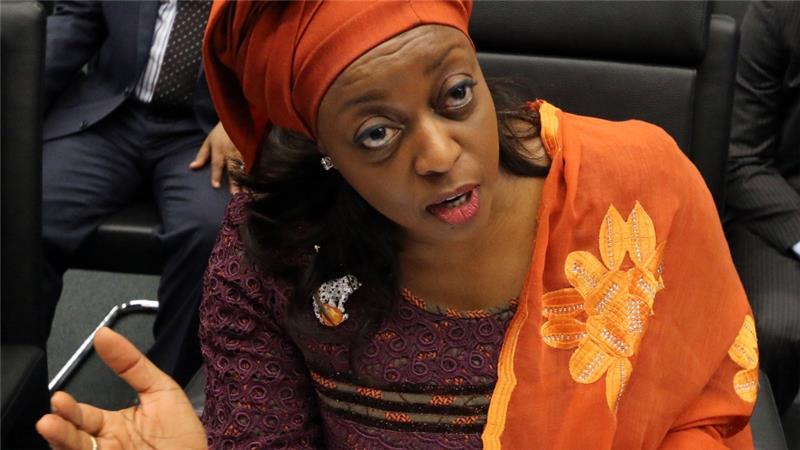- Court Strikes out Alison-Madueke’s Name from $1.6bn Fraud Trial
Justice Nnamdi Dimgba of the Abuja division of the Federal High Court Wednesday struck out the name of the former Minister of Petroleum Resources, Mrs. Diezani Alison-Madueke, in the ongoing trial of the Chairman of Atlantic Energy Drilling Concept (AEDC) Nigeria Limited, Mr. Jide Omokore, and five others standing trial over their alleged involvement in a $1.6 billion crude oil fraud.
The trial judge struck out her name while delivering ruling on the former minister’s motion seeking to be joined as a defendant in the suit.
Omokore, AEDC, Atlantic Energy Brass Development (AEBD) Ltd., Victor Briggs, Abiye Membere and David Mbanefo are standing trial for their alleged involvement in defrauding the Nigerian Petroleum Development Company (NPDC), the exploration and production subsidiary of the Nigerian National Petroleum Corporation (NNPC), of $1.6 billion.
Omokore and his firms – AEDC and AEBD – had entered into a Strategic Alliance Agreement (SAA) in 2010 to provide funding for the development of six joint venture oil blocks operated by NPDC.
The SAA allowed AEDC and AEBD to recover their investments in the oil acreages through crude oil lifting under an agreed sharing formula with NPDC.
However, both firms were alleged to have diverted part of the proceeds from the sale of the crude oil which should have paid to NPDC.
But sources close to AEDC and AEBD have maintained that the amount due to NPDC stood at about $800 million as of 2015, and not $1.6 billion as alleged by the Economic and Financial Crimes Commission (EFCC), which charged the parties to court for alleged fraud early this year.
Of the $800 million, they disclosed that $500 million had been repaid to the NPDC after a reconciliation process.
They have also maintained that the companies had not committed any fraud and the matter was a breach of contract which should have gone to arbitration as provided for in the SAA.
At the resumed trial Wednesday, Alison-Madueke had through her lawyer, Dr. Onyechi Ikpeazu (SAN), applied to Justice Dimgba to be joined as one of the defendants in the suit.
She predicated the request on the grounds that count eight of the nine-count charge proffered against the six defendants had mentioned her name, even though the prosecution did not make her one of the defendants.
In the motion argued before Justice Dimgba, Alison-Madueke maintained that her application would not prejudice the criminal trial but rather afford her the opportunity to be heard in the interest of fair hearing.
Ikpeazu said the applicant would be grossly prejudiced if the application was refused by the court, adding that the refusal would further compound the gross violation of her constitutional rights.
In opposing the application, counsel to the EFCC, Aliyu Yusuf, urged the court to decline her request to be joined as a defendant.
Yusuf told the court that Alison-Madueke was currently under investigation by the Metropolitan Police, London for several crimes and has been admitted to bail in the United Kindom but could not leave the country.
“The applicant seeing that the investigations by the Metropolitan Police had reached advanced stage, and that trial in the instant charge before this honourable court is proceeding smoothly, had designed the instant application to distract and scuttle both her investigation and imminent prosecution in the United Kingdom and the trial before this court,” Yusuf argued.
He further claimed that Alison-Madueke knew she would not be able to leave the United Kingdom, in view of ongoing investigation and imminent prosecution, and was therefore seeking the order to amend the charge for her name to be included on the face of the charge in order “to escape investigation and prosecution in the United Kingdom under the guise that she is coming to face her trial before this court and also scuttle the trial”.
In a brief ruling, Justice Dimgba held that the EFCC could not eat its cake and have it because by including Alison-Madueke’s name in count eight of the charge, the commission ought to have made her one of the defendants.
The judge therefore struck out count eight where Alison-Madueke’s name was mentioned in the suit and adjourned trial of the substantive matter till October 5 and 6.


 Billionaire Watch3 weeks ago
Billionaire Watch3 weeks ago
 Startups4 weeks ago
Startups4 weeks ago
 News4 weeks ago
News4 weeks ago
 News4 weeks ago
News4 weeks ago
 Bitcoin4 weeks ago
Bitcoin4 weeks ago
 Naira4 weeks ago
Naira4 weeks ago
 Forex3 weeks ago
Forex3 weeks ago
 Treasury Bills4 weeks ago
Treasury Bills4 weeks ago
























